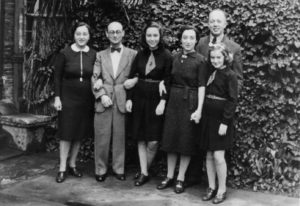Max Leibovich Dead at 75, JTA, Jan. 15, 1982.
 Max Leibovich, one of the last members of the Shanghai Jewish refugee community which once numbered over 20,000 people, died in Shanghai earlier this month, it was reported here today by the American Joint Distribution Committee (JDC). He was 75 years old according to JDC executive vice president Ralph Goldman.
Max Leibovich, one of the last members of the Shanghai Jewish refugee community which once numbered over 20,000 people, died in Shanghai earlier this month, it was reported here today by the American Joint Distribution Committee (JDC). He was 75 years old according to JDC executive vice president Ralph Goldman.
Leibovich had been disabled by Parkinson’s Disease for many years before his death and been attended by a former cook of the wartime refugee camp in Shanghai, Goldman reported. His care was made possible by the continuing financial aid of the JDC which began helping the Jews of Shanghai in the late 1930’s. Leibovich, who was born in Russia, came to Shanghai in the 1930’s and operated a business there before and after the war.
In recent years when travel into China was again possible, Leibovich was visited by a number of JDC leaders. They noted that the ravages of Parkinson’s Disease had left Leibovich without the ability to speak clearly, but Leibovich, who had once spoken and read English, Russian, Yiddish and Chinese, could still hear and “his eyes would light up” whenever a visitor would come to see him, Goldman said.
History Of The Jewish Immigrants
According to the JDC records, the greatest flow in the stream of Jews to Shanghai took place in the years 1938 and 1939 when more than 17,000 arrived, mostly from Germany and Austria. The records show that in 1943 the Jews were forced by Japanese occupation troops into a ghetto. Among the refugees was former Secretary of the Treasury, W. Michael Blumenthal and his mother as well as the family of Yosef Tekoah, former president of the Ben Gurion University of the Negev in Beersheba, Israel, who previously served as Israel’s Ambassador to the United Nations.
The JDC representative in Shanghai during the critical war years was Laura Margolis Yarblum. Though, at first, she was to succeed in establishing an uneasy truce with the Japanese, arranging to feed and care for half of the 20,000 refugees, she was later thrown into a Japanese internment camp where she was for 10 months before being released in an exchange of prisoners.
The survivors recall that life was not easy in Shanghai. Blumenthal called it a “cesspool and a den of iniquity.” But the JDC records show that despite the poverty, there was a rich cultural life. The community claimed three daily newspapers, a symphony orchestra and many plays were produced. Jewish education continued. There were Talmudei Torah, Yeshivot, and youth clubs.
After the war, the community emptied out rapidly. Except for those few who, like Leibovich, stayed behind because of family ties or illness. With the death of Leibovich, the JDC caseload in Shanghai is reduced to three — the last trace of an interesting chapter in Jewish history.



